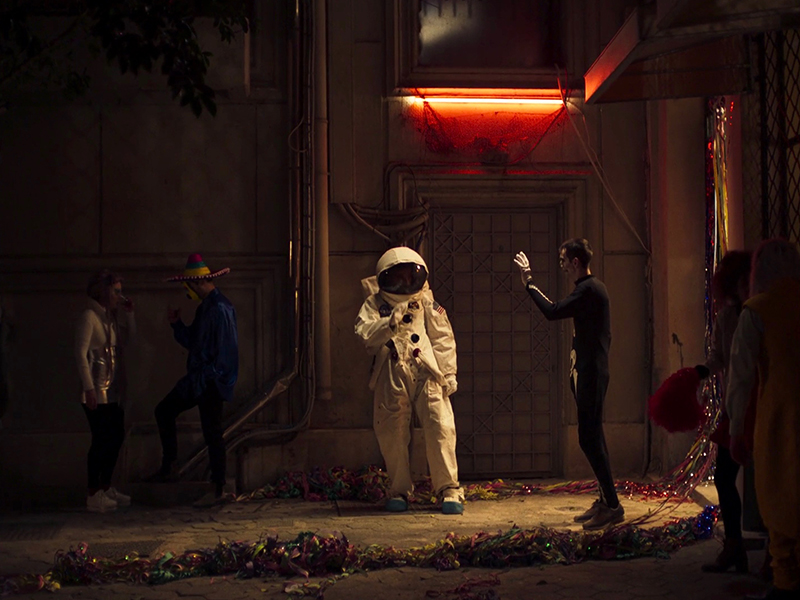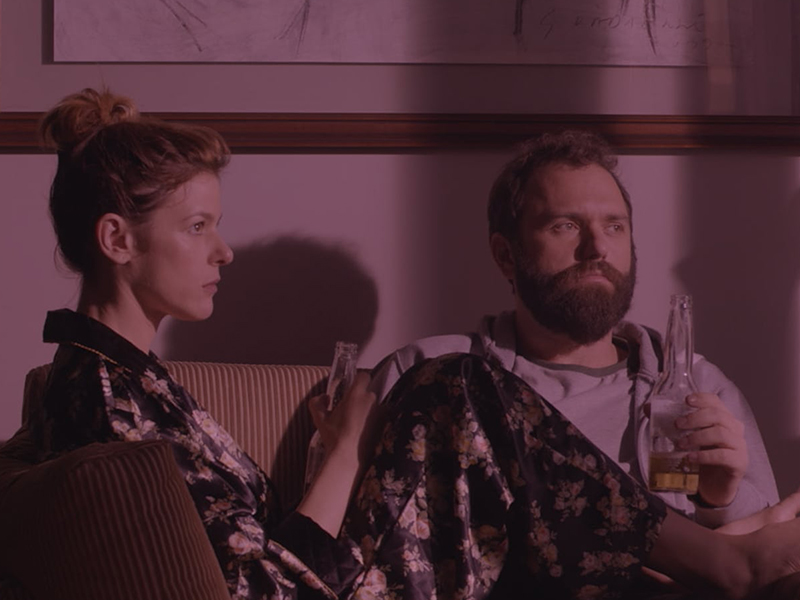TIFF.20 – From here to the end of the line. The Pink Cloud and Apples
I can’t help but notice how annoying this “pandemic film” label has become, which we are sticking onto most films released after we have barricaded ourselves in our homes, where every little crumb of sci-fi constructed on the possibility of an Apocalypse is the film which completely encompasses the domestic experience of the Covid age. Two of the films which had to suffer this particular filter of interpretation are, surprisingly enough, debut films that have been crisscrossing festivals lately, even though they are both written and produced in pre-pandemic times: one is Apples, directed by Christos Nikou, a militant descendent of Yorgos Lantimos’ cinema, to whom Cate Blanchett attached herself as a producer; the other is The Pink Cloud by Iuli Gerbase, a hot pink Brazilian film starting off from an absurdist premise (how else could I call the fact that a handful of people end up spending the rest of their lives in the place where a toxic storm left them stranded?). I am not discussing the probability or plausibility of these premises, despite the fact that this is where most errors in scriptwriting are born: there’s a toxic cloud that’s killing people in The Pink Cloud, yet somehow it’s impossible to build an entire underground city during one’s lifetime, especially one that perfectly mirrors the one where you used to live? Similarly, Apples rests on the insufficiently explored notion of collective amnesia – people seem to just suddenly and randomly lose their memories, while doing the most mundane tasks (driving their cars, eating, sleeping in the bus), and most of them are struck by the tragedy when they don’t have their ID cards or cellphones on them, and are thrown into the lion’s den smack in the middle of the 21st century. I’m not going to complain any further about this – especially because I wholeheartedly believed in the characters’ shifting visages in What Do We See When We Look at the Sky, Alexandre Koberidze’s love fantasy, showcased in the same main competition at Transilvania IFF. In the following, I will spend less time discussing these films’ visionary nature or their premonitions regarding the pandemic which we are experiencing and more about how these worlds function at a larger level- strictly speaking from this angle of the pandemic, these worlds are as thin and boring as they can get; their true goals are character studies, transformations, and bruises.
Social media freaks

In Apples, the plague of forgetfulness grasps Aris (Aris Servetalis) while he is on a bus; he cannot remember his name or his address, all he knows is that he’s feeling an insatiable pleasure towards eating red apples (and this is as far as the platonic metaphor of the cave goes). He’s led to a social rehabilitation program, where the government gives lost people a home and a salary – well, nothing comes for granted, and the participants have the responsibility of taking over their new identities in a controlled fashion. They receive tapes with instructions: small tasks explained step by step, that become increasingly hard, meant to put them in a difficult spot, each to be documented with a Polaroid picture (and this is as far as the metaphor of Instagram addiction goes); those responsible can barge into your home at any giver hour to check your notes and see if you took your picture properly, if you’re keeping a record of things, meaning a photo and a checkmark. This way, Nikou is trying to construct a light comedy about attempts at engineering social uniformity, about social media freaks, about the fear of loneliness.
Despite the fact that he denies any sort of affiliation with Lanthimos in interviews, Nikos’ protagonist is simply bressonian in the vein of Lanthimos (he’s followed by deadpan humor, he’s asexual, stiff, robotic). On top of it, he finds his partner in yet another amnesiac, a woman, but the difference is that she’s further ahead down the line of tasks than he is. Both are naive in a reductive sense: she gets so scared of horror flicks that she hides under a chair, he cannot conceive of eating anything other than apples; the charade is extremely similar to Dogtooth (dir. Yorgos Lanthimos, 2009), where one family’s kids know nothing else than the reality offered by their parents, one that was essentially fabricated. Anyways, Nikou is not a cynic, and he knows when he shouldn’t push things, and Apples substitutes tragedy with a less-pretentious gallery of comical vignettes seen in long shots – Aris as he is borrowing a girl’s tiny bicycle to take a picture, not before seriously scratching it on both sides; Aris attempting to go to a strip club; Aris in a spacesuit, following a costumed Batman as he is losing his memory. The modifications or changes are somehow subtle – if, initially, he is docile and disciplined, slowly, his little revolts, manifesting as skipping obligatory tasks (to have a one night stand, for example) and up to the shock of eating other fruits, slowly start to appear. Servetalis didn’t seem fully convincing in this process of rehabilitation. On top of it, this idea about a dissolving identity, which is otherwise intriguing, gets lost in this insular love story, and so, how do we ever find out what happens to the other amnesiacs – have they ever remembered anything?
A refrain for the end of the world

The Pink Cloud doesn’t offer any escape hatches to its characters – not even a little hand or a ray of hope to cling on to; if this is a spoiler, then I can say that the film is probably the most fatalistic huis clos out there; even in the case of Buñuel, the torturous experiences of the bourgeois came to an end at one pint. Giovana (Renata de Lélis) and Yago (Eduardo Mendonça) end up staying together forever after having a one night stand; the morning after their initial spark of love, the toxic cloud which kills anyone that stands longer than 10 seconds in its proximity makes its appearance. It’s clear that the two are privileged individuals who end up stuck in a two-story building, with many rooms, food stocks and everything; the same cannot be said about those who get stuck for decades in a pharmacy. Iuli Gerbase mentions the others, but she is only interested in this particular couple. Yago and Giovana fare well for a while; they engage in erotic explorations, they go rollerblading through the house, they keep on working remotely. The melodrama deepens, of course, in the differences between the two and the increasingly smaller walls of the house. Paradoxically, even through the entire plot is set in this upper-class house, Gerbase manages the strange feat of showing it differently in every single shot, without particularizing it or making it feel in any way claustrophobic; from the beginning to the end of the film, the camera keeps on discovering new spaces it has never entered before (a balcony, a bedroom, a couch); for a space of terror, this house seems much too big and abounding in supplies. Anyway, this isn’t always a bothersome detail – sometimes they modify the space themselves in order to simulate other places (like a nightclub where they play a ridiculous game of seduction by using the lights, or a dinner in a more unconventional corner of the living room). Their food arrives through a tube that always looks the same, in spite of the colossal ellipses (passing from one year of the pandemic to ten, and so on and so forth), at one point a child that is delivered remotely arrives to their home, and technology simply seems to stagnate. Beyond the impossibility of finding a solution to the crisis, the filmmaker rarely comes up with new ideas in this landscape, people simply get old and tired, naturally so; a VR headset is a must, since how else could we face reality, and so on. Simulating such a global pandemic is simply not efficient; Gerbase’s way of imagining that audiences will remain hooked on the premise all the way to the end is simply lazy; the fights between the couple are just the touchstones of this story that doesn’t offer anything colorful, in the end, just a sliver of pinkish light that floods all of the windows.
Otherwise, the ideas behind this alternative pandemic might seem to be steeped in the Zeitgeist, but the truth is that they have always been among us; both here, as in Apples, pandemics are exceptional, but have a very lax deployment, lacking in any scientific bases or in any grains of realism (such as, for example, the reliance on global warming), and are rather poetical (the pink cloud which keeps one stuck in the same place from start to end is implausible, no matter how impotent humanity is; the forgetfulness imagined by Nikou is metaphorical and seems to be psychosomatic), while both try their hand at social commentary. In The Pink Cloud, after entire decades, people end up killing each other in a supermarket, despite the fact that it’s not clear how exactly they managed to cohabit in the first place; the lack of attention towards these fine details, which are truly revelatory (and not just a simple story of a man and a woman bearing each other), would have elevated these films beyond the mere status of slices of life.
Journalist and film critic, with a master's degree in film critics. Collaborates with Scena9, Acoperișul de Sticlă, FILM and FILM Menu magazines. For Films in Frame, she brings the monthly top of films and writes the monthly editorial Panorama, published on a Thursday. In her spare time, she retires in the woods where she pictures other possible lives and flying foxes.


